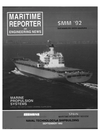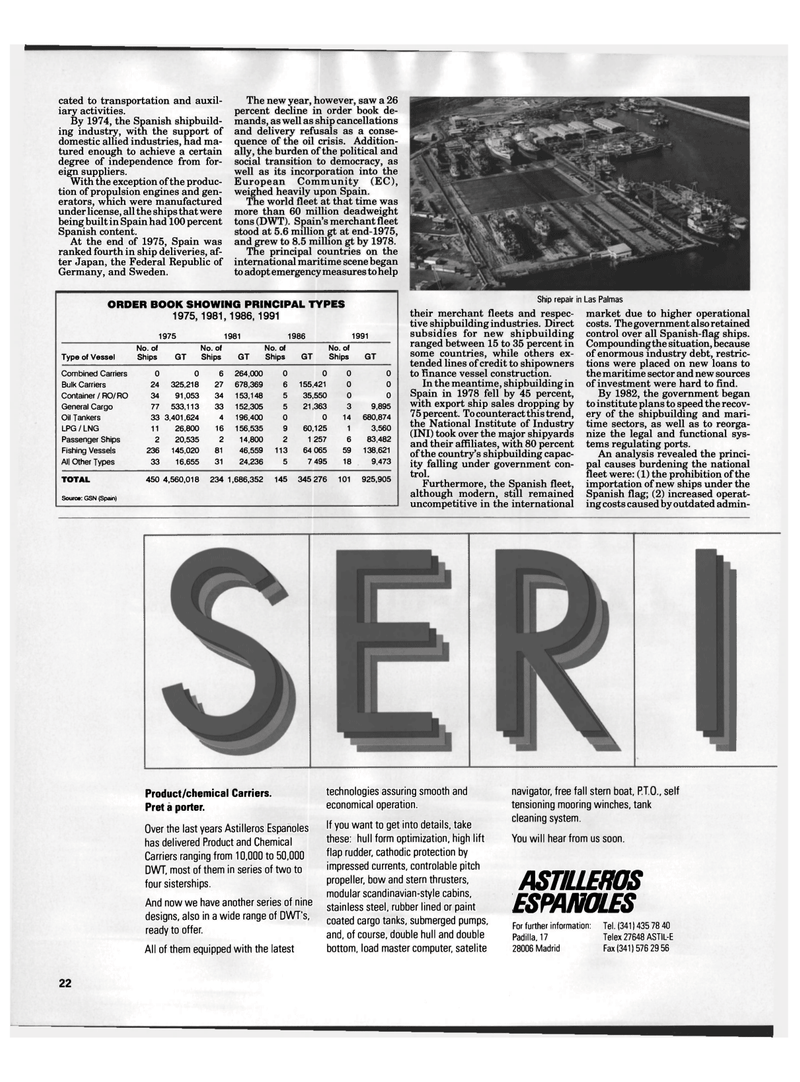
Page 20: of Maritime Reporter Magazine (September 1992)
Read this page in Pdf, Flash or Html5 edition of September 1992 Maritime Reporter Magazine
cated to transportation and auxil- iary activities.
By 1974, the Spanish shipbuild- ing industry, with the support of domestic allied industries, had ma- tured enough to achieve a certain degree of independence from for- eign suppliers.
With the exception of the produc- tion of propulsion engines and gen- erators, which were manufactured under license, all the ships that were being built in Spain had 100 percent
Spanish content.
At the end of 1975, Spain was ranked fourth in ship deliveries, af- ter Japan, the Federal Republic of
Germany, and Sweden.
The new year, however, saw a 26 percent decline in order book de- mands, as well as ship cancellations and delivery refusals as a conse- quence of the oil crisis. Addition- ally, the burden of the political and social transition to democracy, as well as its incorporation into the
European Community (EC), weighed heavily upon Spain.
The world fleet at that time was more than 60 million deadweight tons (DWT). Spain's merchant fleet stood at 5.6 million gt at end-1975, and grew to 8.5 million gt by 1978.
The principal countries on the international maritime scene began to adopt emergency measures to help
ORDER BOOK SHOWING PRINCIPAL TYPES 1975, 1981, 1986, 1991 1975 1981 1986 1991
Type of Vessel
No. of
Ships GT
No. of
Ships GT
No. of
Ships GT
No. of
Ships GT
Combined Carriers 0 0 6 264,000 0 0 0 0
Bulk Carriers 24 325,218 27 678,369 6 155,421 0 0
Container / RO/RO 34 91,053 34 153,148 5 35,550 0 0
General Cargo 77 533,113 33 152,305 5 21,363 3 9,895
Oil Tankers 33 3,401,624 4 196,400 0 0 14 680,874
LPG / LNG 11 26,800 16 156,535 9 60,125 1 3,560
Passenger Ships 2 20,535 2 14,800 2 1 257 6 83,482
Fishing Vessels 236 145,020 81 46,559 113 64 065 59 138,621
All Other Types 33 16,655 31 24,236 5 7 495 18 9,473
TOTAL
Source: GSN (Spain) 450 4,560,018 234 1,686,352 145 345 276 101 925,905
Ship repair in Las Palmas their merchant fleets and respec- tive shipbuilding industries. Direct subsidies for new shipbuilding ranged between 15 to 35 percent in some countries, while others ex- tended lines of credit to shipowners to finance vessel construction.
In the meantime, shipbuilding in
Spain in 1978 fell by 45 percent, with export ship sales dropping by 75 percent. To counteract this trend, the National Institute of Industry (INI) took over the major shipyards and their affiliates, with 80 percent of the country's shipbuilding capac- ity falling under government con- trol.
Furthermore, the Spanish fleet, although modern, still remained uncompetitive in the international market due to higher operational costs. The government also retained control over all Spanish-flag ships.
Compounding the situation, because of enormous industry debt, restric- tions were placed on new loans to the maritime sector and new sources of investment were hard to find.
By 1982, the government began to institute plans to speed the recov- ery of the shipbuilding and mari- time sectors, as well as to reorga- nize the legal and functional sys- tems regulating ports.
An analysis revealed the princi- pal causes burdening the national fleet were: (1) the prohibition of the importation of new ships under the
Spanish flag; (2) increased operat- ing costs caused by outdated admin-
Product/chemical Carriers.
Pret a porter.
Over the last years Astilleros Espanoles has delivered Product and Chemical
Carriers ranging from 10,000 to 50,000
DWT, most of them in series of two to four sisterships.
And now we have another series of nine designs, also in a wide range of DWT's, ready to offer.
All of them equipped with the latest technologies assuring smooth and economical operation.
If you want to get into details, take these: hull form optimization, high lift flap rudder, cathodic protection by impressed currents, controlable pitch propeller, bow and stern thrusters, modular scandinavian-style cabins, stainless steel, rubber lined or paint coated cargo tanks, submerged pumps, and, of course, double hull and double bottom, load master computer, satelite navigator, free fall stern boat, P.T.O., self tensioning mooring winches, tank cleaning system.
You will hear from us soon.
ASTILLEROS
ESPANOLES
For further information: Tel. (341) 435 78 40
Padilla, 17 Telex 27648 ASTIL-E 28006 Madrid Fax (341) 576 29 56 22

 19
19

 21
21
